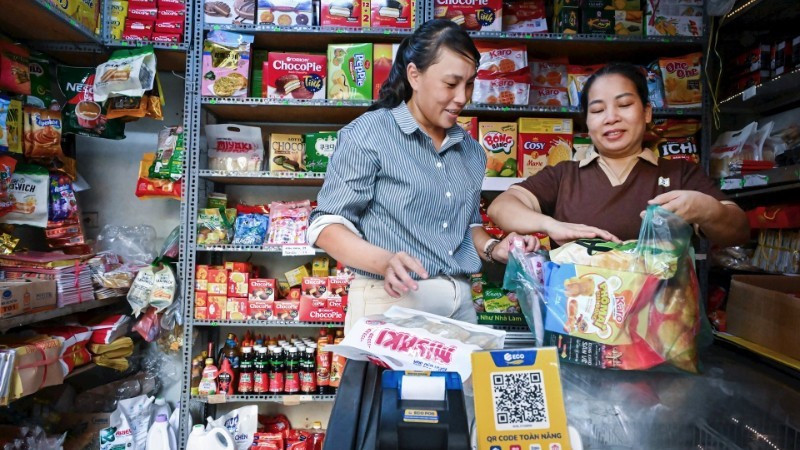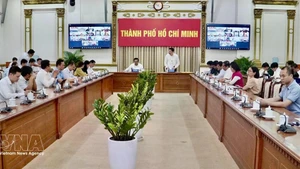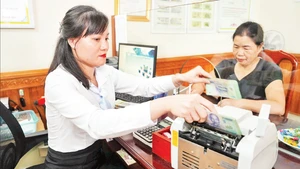Creating channels to support private-sector development
Viet Nam currently has over five million household businesses, contributing nearly 30% of GDP and generating more than 10 million jobs. This issue is clearly highlighted in Resolution No. 68-NQ/TW, dated May 4, 2025, of the Politburo on private-sector development, reviewing and improving the legal framework for individual business activities; minimising disparities, and creating favourable conditions in management and financial–accounting regimes to encourage household businesses to transform into enterprises.”
Supporting household businesses in accessing financial technology and shifting to enterprise models is one of the key solutions being actively implemented, helping promote the private economy, enhance competitiveness, and expand budget revenues. The key focus of the Politburo’s Resolutions No. 57/NQ-TW and No. 68/NQ-TW is to create institutional breakthroughs for innovation, remove long-standing prejudices against the private sector, and make a bold shift in mindset, laying the foundation for confidence, unlocking domestic potential, ensuring business freedom, fair competition, and protection of entrepreneurs’ and household businesses’ rights.
In this context, inclusive finance plays a dual role: a social security instrument and a platform for inclusive economic growth. The Government of Viet Nam has taken a proactive approach by working with the World Bank (WB) to develop a National Financial Inclusion Strategy. On January 22, 2020, the Prime Minister signed Decision No. 149/QD-TTg, approving the National Financial Inclusion Strategy to 2025, with a vision to 2030. The strategy’s central goal is to maximise access to and use of suitable, safe, and affordable financial products for all citizens, particularly vulnerable groups and small businesses.
As the strategy has been translated into policy and practice, the fintech business community in Viet Nam has emerged as a pioneer in creatively applying the Party and State’s orientations on financial inclusion and private-sector development.
According to Dr Tran Van of the Institute for Digital Economy Development Strategy (IDS), Viet Nam is shaping its own model for providing digital financial services. Within this ecosystem, fintech companies not only support the digitalisation of household and small businesses but also deliver modern, affordable, and accessible financial services.
IDS’s research findings indicate positive improvements in financial access after five years of implementing the strategy. However, based on data from the WB and the State Bank of Viet Nam, the institute found significant disparities in access levels. For example, the share of low-income individuals owning bank accounts rose by only about 6% over five years. Small, micro, and household businesses—despite their economic significance—still face obstacles in accessing formal credit. The gap in access to financial services among income groups and business scales has widened, with low-income individuals and microenterprises being most disadvantaged.
Open mindset to accelerate digital transformation
Researchers note that Viet Nam remains among the countries that are slow to improve access to finance for small and medium-sized enterprises, primarily due to structural issues such as collateral requirements, high interest rates, and complex procedures.
Dr Nguyen Duc Kien, Chairman of IDS’s Scientific Council, and former Head of the Prime Minister’s Economic Advisory Group, emphasised that initial progress under the National Financial Inclusion Strategy was achieved through innovative thinking and openness among policymakers and State management staff.
“If we fail to maintain an open mindset when formulating policies to foster digital transformation, the early gains could be reversed,” Dr Kien cautioned.
With innovation and people-centred thinking at its core, the National Financial Inclusion Strategy is expected to serve as a “golden key” for Viet Nam to advance sustainably and become a regional model for digital transformation and financial inclusion.
To create an open forum to discuss opportunities for nearly five million household businesses, on October 17, 2025, Nhan Dan Newspaper, in collaboration with IDS, host a seminar titled “Implementing the National Financial Inclusion Strategy – Opportunities for household businesses to access financial technology and drive growth” at No. 71 Hang Trong Street, Ha Noi.
The seminar featured representatives from the Ministry of Industry and Trade, the Ministry of Science and Technology, the Ministry of Finance, the State Bank of Viet Nam, the National Assembly’s Economic and Financial Committee, and the National Assembly’s Scientific, Technological and Environmental Committee, along with economic and financial experts, representatives of fintech enterprises, tech start-ups, and domestic and international investors.
During the discussion sessions, representatives of the National Assembly’s committees, ministries, and experts shared insights on challenges and policy solutions to build a healthy, sustainable digital financial services market that effectively supports the next phase of the National Financial Inclusion Strategy.
Notably, at the event, IDS researchers introduced the monograph “Financial inclusion: A driver for high growth in the 2026–2045 period.” The publication compiles findings from the scientific research project “National Financial Inclusion Strategy: A new capital access pathway for small, micro, and household businesses in Viet Nam.”
“In January 2020, the Prime Minister signed Decision No. 149/QD-TTg approving the National Financial Inclusion Strategy to 2025, with a vision to 2030, aiming to maximise access to and use of suitable financial products for all citizens, contributing to rapid and sustainable growth. During this period, the Prime Minister’s Economic Advisory Group brought together experts, economists, and enterprises to conduct a preliminary assessment after three years of implementation.
The book presents survey data from 2015 to 2023 and outlines government measures, particularly during the COVID-19 pandemic, that helped the Vietnamese economy avoid crisis, making it one of the countries with rapid growth, stable macroeconomic conditions, and ensured living standards for its people during the global pandemic period.”
(Excerpt from the book introduction by Prime Minister Pham Minh Chinh)
















